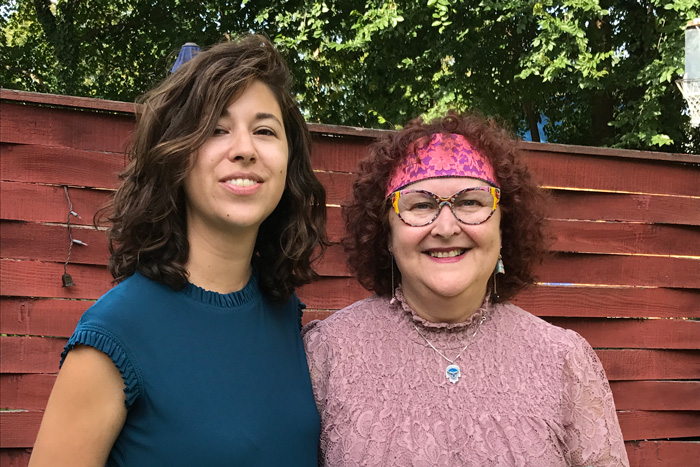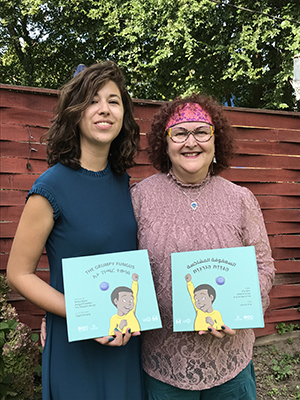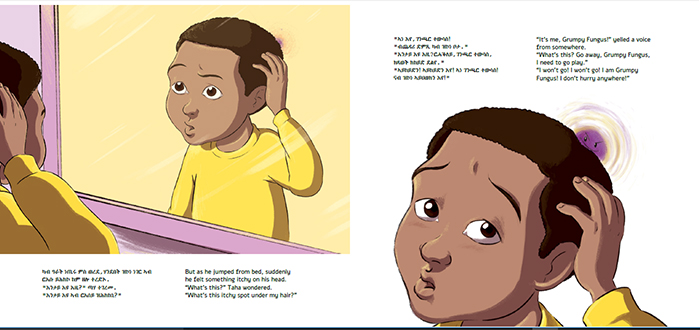Kids' Lit Goes Antiviral

Avigal Fishelov ’11 and her mom, Associate Professor of Judaic Studies Nitsa Kann.
Dickinsonian family fights health issue through children’s book
by MaryAlice Bitts-Jackson

Avigal Fishelov ’11 and her mom, Associate Professor of Judaic Studies Nitsa Kann.
Parents fleeing the war-torn streets of Eritrea and Sudan to secure a better life for their children may find relative safety in Tel Aviv, Israel, but they also pay a price. While seeking asylum, they often work irregular hours at low-paying jobs and must send their children to low-cost, overcrowded and unofficial daycare centers—often unsupervised and housing 40-90 children in a single apartment. These conditions place their children at high risk of ringworm—a highly contagious fungal infection—which spreads quickly from child to child.
Avigal Fishelov ’11 saw that health crisis firsthand while completing her master’s degree in public health at Tel Aviv University. As part of a service-learning project with a local nonprofit, she set out to assist vulnerable asylum-seeking families in how to spot and seek help for this condition. Her solution: to write a children’s book about ringworm and distribute it free to asylum-seeking families.
Fishelov cast a net for an experienced co-writer and found one in her own family—and a translator, besides.
Fishelov, who majored in psychology and religion, is the daughter of Nitsa Kann, an associate professor of Judaic studies and author two books of poems, two novels and a number of scripts for Israeli television, including scripts for Sesame Street. Together, they wrote a book in Hebrew about a child who is infected with ringworm, along with cowriter Iris Shapiro-Bratt. Kann’s wife, Melanie Lowe ’85, a former American studies major at Dickinson, provided the English translation.
The book’s title translates to The Grumpy Fungus, and it tells the story of Taha, a boy who wakes up with an itchy scalp and asks his father and mother for help. His mother takes him to a clinic, and the doctor gives him medicine. He learns that he must wash his hands often to avoid reinfection.
Fishelov and Kann researched the best way to tell the story to the targeted readers—for example, they selected the name “Taha” for the main character because it is a familiar name to Eritrean children and carries positive connotations in their communities. “Especially since reading bedtime stories is not common in these cultures, we wanted the children to have an instant connection with the book and main character,” Fishelov says.
The illustrations, by Israeli animator-illustrator Eyal Chirurg, were also carefully considered. Fishelov and Chirurg sought detailed consultations from representatives from the Eritrean community to be sure that the images in the book would be positively received.

Illustration from The Grumpy Fungus, by Nitsa Kann and Avigal Fishelov, with Iris Shapiro-Bratt.
Independently published, with translations in Hebrew, English, Arabic and Tigrinya, the book was sponsored by Change a World, a service-learning NGO. That organization's volunteers will distribute copies, free of charge, to children and their families at clinics and daycare centers in Tel Aviv.
Fishelov admits that it was challenging to co-create across national borders—she remains in Israel, finishing up her master’s thesis, while Kann and Lowe live in Carlisle, Pennsylvania—but also says the project was satisfying.
“Going into the field of public health, I never thought I would be able to collaborate with my mother on such an interesting and challenging project,” says Fishelov, who’s considering collaborating with her mother on additional educational children’s books, each addressing a different health issue. “It was a great joy that I was able to get family members involved.”
TAKE THE NEXT STEPS
Published September 26, 2017